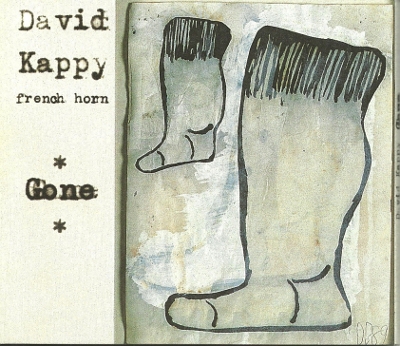|
DAVID KAPPY
Gone
Reviewed by Robert Reigle
Tracks:
David Kappy and Stuart Dempster, “Cistern Music” (1996)
Giacinto Scelsi, “Quattro Pezzi” (1956)
Daniel Harris, “Iron Lung (1976)
Andrew Will Recording, no number.
Published in 2000.
Total time 65.38
http://www.andrewwill.com/
 David Kappy is the Professor of Horn at the University of Washington, in Seattle. In Gone,
he presents three contrasting works spanning four decades: a series of
improvised duets, a meticulously notated composition for solo horn, and
a work for horn and electronics. David Kappy is the Professor of Horn at the University of Washington, in Seattle. In Gone,
he presents three contrasting works spanning four decades: a series of
improvised duets, a meticulously notated composition for solo horn, and
a work for horn and electronics.
The album opens with “Cistern Music,” a series of five improvisations
Kappy did with Stuart Dempster, in an old cistern with a 45”
reverberation—the same place where Dempster had recorded Deep Listening
(released by New Albion Records in 1989). This is slow-moving,
meditative music, the two master musicians reveling in the blurred
overlapping produced by the acoustics of the space. The titles of
the improvisations provide some idea of both the character of the music
and the concepts of improvisation shared by the performers: “Pedals,”
“Overtones,” “Duet,” “Siegfried,” “Didjeriduet.” In addition to
playing French horn, Kappy vocalizes during part of the lengthy final
improvisation, and Dempster makes beautiful timbral explorations on
didjeridu (techniques that he also applies to his trombone playing).
For this listener, the highlight of the album is the world premiere recording of Giacinto Scelsi’s 1956 composition, Quattro Pezzi
for solo horn. Oddly, although this is an extraordinarily
colorful work even for Scelsi, it was one of the last to receive a
commercial recording—some 44 years after its composition. Through
the use of different types of muting, quarter tones, and vibratos,
Scelsi elicits a wider range of subtle timbral variations than those
found in most of his other solo wind instrument works. Later on,
Scelsi arranged the third French horn piece for soprano voice,
including it as the fourth “evocation” in the five-part work “Taiagaru”
(1962).
Since this album’s release, I’ve had the opportunity to hear the Scelsi
piece performed by the great Denis Simandy, while we toured together
with Iancu Dumitrescu’s Hyperion Ensemble. The second recording
of the Quattro Pezzi appeared in 2006, by Andrew Joy, on
Edition Zeitklang. Kappy’s recording was done in a winery and has
less reverb than Joy’s recording, which was made in a concert hall in
Cologne and co-produced by the West German Radio and Edition
Zeitklang. I prefer the drier acoustic of the winery, which
affords both a greater range of, and more direct access to the
extremely fine subtleties of timbral variation wherein lie the
spiritual underpinnings Scelsi intended.
All three performers bring out slightly different characteristics of
the music, and being the first to publish a recording of this demanding
work is a feather in Kappy’s cap. Thanks must go to Chris Camarda
of Andrew Will Winery (http://www.andrewwill.com/), whose love for
Scelsi’s music led to this album as well as an all-Scelsi concert that
included Kappy playing the Quattro Pezzi (http://www.seattleweekly.com/2002-04-24/arts/johnny-one-note/).
The full title of the final piece on Gone is “Music for the
Buy-Centennial: Iron Lung for David Kappy, ARP 2000, Tape Delay, and
Tape.” Composed by Daniel Harris in 1976, this is the world
premiere performance. Harris, born in Chicago in 1943, is an
interesting composer, bass clarinet player, and developer of underwater
sound systems (see danielharrismusic.com).
“Iron Lung” is a free-wheeling, fun piece using the technology of its
day to layer and oscillate amongst short melodic phrases, electronic
sounds, and echo effects.
This is a fine album, and a nice addition to the scant French horn
discography. Kappy is an excellent player, bringing out the
diverse aesthetics of meditation, spiritual intensity, and avant-garde
critique. Interested readers, who may have to do some digging to
acquire a copy of this album (which was limited to a pressing of 1,000
CDs), will be well-rewarded.
|

 David Kappy is the Professor of Horn at the University of Washington, in Seattle. In Gone,
he presents three contrasting works spanning four decades: a series of
improvised duets, a meticulously notated composition for solo horn, and
a work for horn and electronics.
David Kappy is the Professor of Horn at the University of Washington, in Seattle. In Gone,
he presents three contrasting works spanning four decades: a series of
improvised duets, a meticulously notated composition for solo horn, and
a work for horn and electronics.